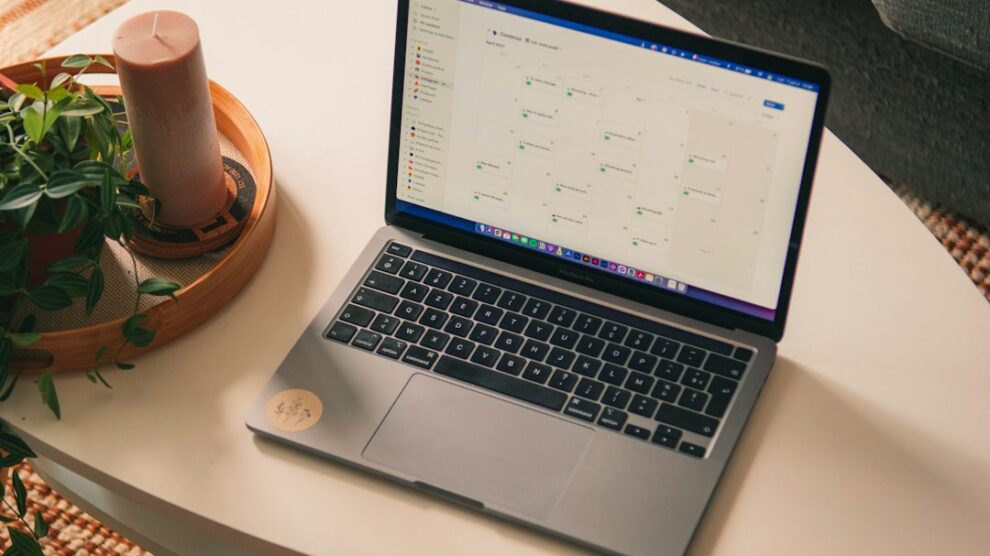In today’s fast-paced digital world, bloggers are constantly looking for ways to streamline their workflow and increase productivity. Enter Notion, the ultimate productivity tool for bloggers. Notion is an all-in-one workspace that allows you to take notes, organize ideas, plan and schedule blog posts, collaborate with team members, manage social media accounts, track analytics, and so much more. With its powerful features and intuitive interface, Notion has quickly become a favorite among bloggers.
Notion offers a wide range of features that can benefit bloggers in numerous ways. One of the key features of Notion is its note-taking capabilities. With Notion, you can create and organize notes in a way that makes sense to you. Whether you prefer a simple list format or a more visual approach with images and tables, Notion allows you to customize your notes to fit your needs.
Another feature that sets Notion apart is its organization capabilities. Notion allows you to create databases, boards, and tables to keep your blogging ideas and inspiration organized. You can easily categorize and tag your ideas, making it easy to find what you need when you need it. This level of organization can be a game-changer for bloggers who often find themselves overwhelmed with ideas and struggling to keep track of them all.
Key Takeaways
- Notion is a powerful productivity tool that can revolutionize your blogging workflow.
- With Notion, you can organize your blogging ideas, create a content calendar, and streamline your blogging process.
- Notion offers tips and tricks for writing and editing blog posts, collaborating with your team, managing social media, and tracking analytics.
- By integrating Notion with other blogging tools, you can maximize your efficiency and productivity.
- Overall, Notion is the ultimate blogging tool that can help you stay organized, focused, and productive.
How Notion Can Revolutionize Your Blogging Workflow
Notion has the power to revolutionize your blogging workflow by streamlining tasks and improving productivity and efficiency. One way Notion can do this is by centralizing all of your blogging tasks in one place. Instead of having multiple apps and tools for note-taking, planning, collaboration, and analytics, you can have everything in one workspace with Notion. This eliminates the need to switch between different tools and saves you time and effort.
Notion also offers templates that are specifically designed for bloggers. These templates can be customized to fit your needs and can help you get started quickly. Whether you need a content calendar, a social media tracker, or a project management board, Notion has a template for it. These templates can save you hours of work and provide a solid foundation for your blogging workflow.
Another way Notion can revolutionize your blogging workflow is through its powerful search functionality. With Notion, you can easily search for specific notes, ideas, or tasks, saving you time and frustration. This is especially useful for bloggers who have a large amount of content and ideas to manage. Instead of scrolling through endless lists and folders, you can simply search for what you need and find it instantly.
Organizing Your Blogging Ideas with Notion’s Powerful Features
One of the key features of Notion is its note-taking and organization capabilities. Notion allows you to create different types of notes, such as text, images, tables, and more. You can customize the format of your notes to fit your needs and preferences. This flexibility allows you to capture your blogging ideas in a way that makes sense to you.
Notion also offers powerful organization features that can help you keep your blogging ideas and inspiration organized. You can create databases, boards, and tables to categorize and tag your ideas. For example, you can create a database for blog post ideas and categorize them by topic or keyword. This makes it easy to find relevant ideas when you’re ready to start writing.
In addition to organizing your ideas, Notion also allows you to add comments and annotations to your notes. This can be useful for jotting down additional thoughts or reminders related to a specific idea. You can also use the comment feature to collaborate with team members or get feedback on your ideas.
Creating a Content Calendar with Notion: Streamlining Your Blogging Process
One of the most important aspects of successful blogging is planning and scheduling your content. Notion can be a game-changer when it comes to creating a content calendar. With Notion, you can easily create a calendar view and drag and drop your blog posts to different dates. This allows you to visualize your content schedule and make adjustments as needed.
Notion also allows you to add additional information to each blog post in your content calendar. You can include the title, topic, keywords, and any other relevant details. This makes it easy to see at a glance what each blog post is about and helps you stay organized.
Another useful feature of Notion’s content calendar is the ability to set reminders and deadlines. You can add due dates to your blog posts and receive notifications when they are approaching. This helps you stay on track and ensures that you never miss a deadline.
Writing and Editing Blog Posts in Notion: Tips and Tricks
Notion offers a range of features that can help streamline the writing and editing process for bloggers. One of the key features is the ability to create different types of content blocks within a note. You can add text, images, tables, code snippets, and more. This allows you to create rich and engaging blog posts without having to switch between different tools.
Notion also offers a distraction-free writing mode that allows you to focus on your writing without any distractions. This mode hides all of the menus and toolbars, leaving only your content on the screen. This can be especially useful for bloggers who struggle with staying focused while writing.
Another useful feature for bloggers is the ability to collaborate with team members on blog posts. Notion allows you to share notes with others and give them editing or viewing permissions. This makes it easy to get feedback on your writing or work on blog posts together with your team.
Collaborating with Your Team on Blogging Projects Using Notion

Notion’s collaboration features make it easy to work on blogging projects with your team. You can share notes, databases, and boards with team members and give them different levels of access. For example, you can give some team members editing permissions, while others have viewing permissions only.
Notion also allows you to leave comments and annotations on notes, making it easy to collaborate and provide feedback. You can tag team members in comments to notify them of specific tasks or questions. This level of collaboration can greatly improve the efficiency and effectiveness of your blogging projects.
Another useful feature for team collaboration is the ability to assign tasks and set deadlines within Notion. You can create a task list within a note or a database and assign tasks to specific team members. You can also set due dates and receive notifications when tasks are approaching or overdue. This helps keep everyone on track and ensures that nothing falls through the cracks.
Managing Your Blog’s Social Media Presence with Notion
Notion can also be a valuable tool for managing your blog’s social media presence. With Notion, you can create a social media tracker to plan and schedule your posts. You can include information such as the date, time, platform, content, and any relevant hashtags or links.
Notion also allows you to add images and videos to your social media posts. You can upload files directly to Notion or embed content from other platforms such as YouTube or Instagram. This makes it easy to create engaging and visually appealing social media posts.
Another useful feature for managing social media accounts is the ability to track engagement and analytics within Notion. You can add metrics such as likes, comments, shares, and followers to your social media tracker. This allows you to see at a glance how your posts are performing and make adjustments as needed.
Tracking Your Blog’s Analytics and Metrics with Notion
Notion offers tracking and analytics features that can help you monitor the performance of your blog. You can create a dashboard within Notion to track metrics such as page views, unique visitors, bounce rate, and more. You can also add charts and graphs to visualize your data and make it easier to analyze.
Notion allows you to integrate with other analytics tools such as Google Analytics or Facebook Pixel. This allows you to pull in data from these tools and display it within Notion. This level of integration can save you time and effort by keeping all of your analytics in one place.
Another useful feature for tracking blog analytics is the ability to set goals and milestones within Notion. You can create a goal tracker and set specific targets for metrics such as page views or email subscribers. Notion will automatically update your progress and show you how close you are to reaching your goals.
Integrating Notion with Other Blogging Tools for Maximum Efficiency
Notion offers a range of integrations with other blogging tools that can help improve efficiency and productivity. For example, you can integrate Notion with tools such as Trello or Asana for project management. This allows you to sync tasks and deadlines between the two tools and avoid duplicate work.
Notion also offers integrations with tools such as Zapier or Integromat, which allow you to automate repetitive tasks. For example, you can set up a workflow that automatically creates a new note in Notion whenever you receive an email from a specific sender. This can save you time and effort by eliminating manual data entry.
Another useful integration is the ability to embed content from other platforms within Notion. For example, you can embed a Google Doc or a Figma design directly into a note in Notion. This allows you to access and edit the content without having to switch between different tools.
Why Notion is the Ultimate Blogging Tool and How You Can Get Started Today
In conclusion, Notion is the ultimate productivity tool for bloggers. With its powerful features and intuitive interface, Notion can revolutionize your blogging workflow and help you stay organized, productive, and efficient. Whether you need to organize your blogging ideas, create a content calendar, collaborate with team members, manage social media accounts, track analytics, or integrate with other blogging tools, Notion has you covered.
To get started with Notion as a blogging tool, simply sign up for a free account on the Notion website. Once you’re signed in, you can start creating notes, databases, boards, and more. Take advantage of the templates and customization options to tailor Notion to fit your specific needs and preferences.
Remember to experiment and explore all of the features that Notion has to offer. Don’t be afraid to try new things and find what works best for you. With time and practice, you’ll become a Notion pro and wonder how you ever managed your blogging workflow without it. So why wait? Start using Notion today and take your blogging productivity to the next level.









Add Comment